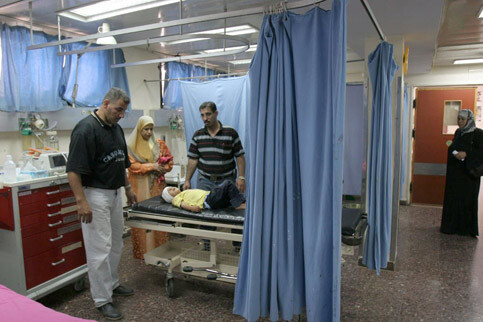IRIN 31 August 2006

A small girl with her parents in the emergency department of Rafidea Hospital (Nablus), 28 August 2006. No nursing staff is seen there. (Naela Khalil/IRIN)
GAZA CITY - In a serious escalation of an ongoing health crisis in the West Bank and Gaza, health sector workers went on strike on Tuesday in protest of unpaid wages.
“The strike is paralysing all primary health care centres that provide maternal and child health services,” said Usama Al Najjar, head of the Health Professions Union. “And all kinds of children’s vaccinations have completely stopped.”
Al Najjar said that if the strike goes on for long, some 300,000 children under the age of three who receive regular vaccinations will suffer.
Government health workers, who number 13,000 in the occupied Palestinian territories (oPt), have been unpaid for the past six months, said Al Najjar. The government has tried to appease employees by granting them two advances of US $300 each over this period, but to no avail.
When health workers threatened to strike in protest on 23 August, the government responded with a memo on 28 August, signed by Palestinian Health Minister Dr Basim Naeem, warning employees that “a strike to protest unpaid salaries serves the occupation”.
The health workers went on strike on the next day, Tuesday, although emergency cases are still being received.
“This escalatory step was taken after the health minister neglected our demands and threatened to fire whoever participates in the strike,” said Al Najjar.
An international trade embargo has been imposed on the Palestinian National Authority (PNA) since the democratic election of a Hamas-led government in February. Hamas is considered a terrorist organisation by Western nations and Israel because it has refused to renounce violence and to recognise Israel as a state.
The major debilitating effect of the embargo is that it is stripping the Palestinian government of much-needed aid and income. The PNA had previously received financial assistance from the European Union and the United States.
In 2005, this amounted to about US $1 billion, but the EU and the US suspended all direct aid on 7 April 2006 after the Hamas victory, according to the EU and the US State Department.
In addition, Israel and the Western countries have blocked millions of dollars-worth of monthly financial aid from Arab donor countries.
As a result, the PNA has been unable to fully pay the salaries of 165,000 public servants. While the workers understand the predicament their government is in, they feel the authorities have had enough time to come up with a solution, said Al Najjar.
A general nationwide strike for all government employees in oPt is planned for 2 September, according to the Health Professions Union and the Government Employees Union.
The Palestinian government fears such a strike will prevent the start of the academic year for thousands of Palestinian students.
“The Palestinian government cannot be held responsible for the embargo,” said government spokesperson Ghazi Hamad. “A strike will harm the Palestinian national interest and will heighten the crisis. The strike is political and aims at harming Hamas and the government. It is not built on a legal basis.”
In response to the government, Al Najjar said, “Unions are licensed and the Palestinian law allows strikes. We abided by the legal procedures of strikes and Palestinian Authority departments were informed of a nationwide strike a long time back.”
“The only way to avoid the strike is to pay the six months of overdue salaries and provide guarantees to pay the salaries in the upcoming months,” said Bassam Zakarneh, head of the Government Employees Union.
This item comes to you via IRIN, a UN humanitarian news and information service, but may not necessarily reflect the views of the United Nations or its agencies. All IRIN material may be reposted or reprinted free-of-charge; refer to the copyright page for conditions of use. IRIN is a project of the UN Office for the Coordination of Humanitarian Affairs.
Related Links